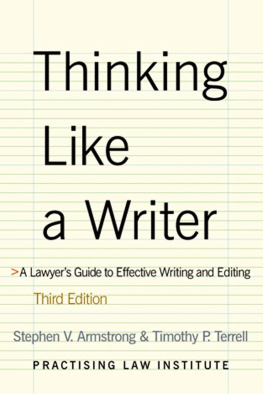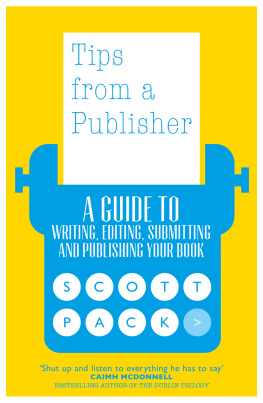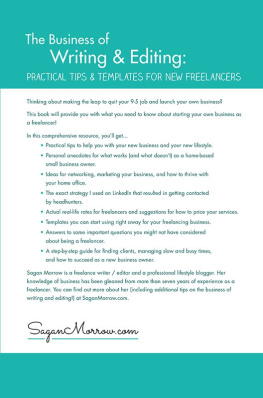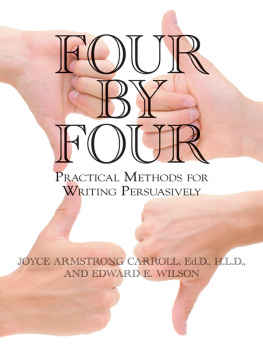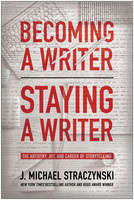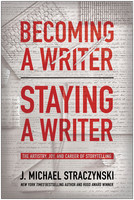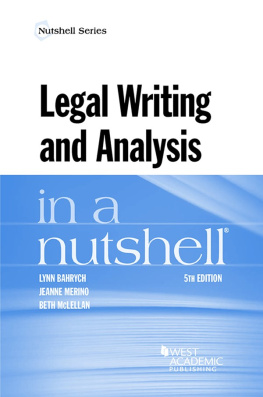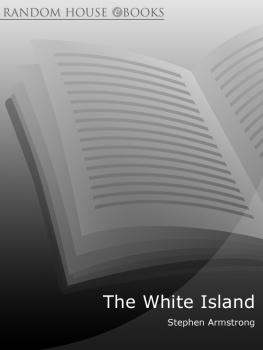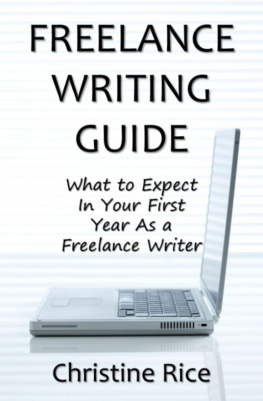Stephen V. Armstrong - Thinking Like a Writer: A Lawyers Guide to Effective Writing & Editing
Here you can read online Stephen V. Armstrong - Thinking Like a Writer: A Lawyers Guide to Effective Writing & Editing full text of the book (entire story) in english for free. Download pdf and epub, get meaning, cover and reviews about this ebook. year: 2009, publisher: Practising Law Institute, genre: Romance novel. Description of the work, (preface) as well as reviews are available. Best literature library LitArk.com created for fans of good reading and offers a wide selection of genres:
Romance novel
Science fiction
Adventure
Detective
Science
History
Home and family
Prose
Art
Politics
Computer
Non-fiction
Religion
Business
Children
Humor
Choose a favorite category and find really read worthwhile books. Enjoy immersion in the world of imagination, feel the emotions of the characters or learn something new for yourself, make an fascinating discovery.
- Book:Thinking Like a Writer: A Lawyers Guide to Effective Writing & Editing
- Author:
- Publisher:Practising Law Institute
- Genre:
- Year:2009
- Rating:3 / 5
- Favourites:Add to favourites
- Your mark:
- 60
- 1
- 2
- 3
- 4
- 5
Thinking Like a Writer: A Lawyers Guide to Effective Writing & Editing: summary, description and annotation
We offer to read an annotation, description, summary or preface (depends on what the author of the book "Thinking Like a Writer: A Lawyers Guide to Effective Writing & Editing" wrote himself). If you haven't found the necessary information about the book — write in the comments, we will try to find it.
Thinking Like a Writer: A Lawyers Guide to Effective Writing & Editing — read online for free the complete book (whole text) full work
Below is the text of the book, divided by pages. System saving the place of the last page read, allows you to conveniently read the book "Thinking Like a Writer: A Lawyers Guide to Effective Writing & Editing" online for free, without having to search again every time where you left off. Put a bookmark, and you can go to the page where you finished reading at any time.
Font size:
Interval:
Bookmark:

Thinking Like a Writer
A Lawyers Guide to Effective Writing and Editing
Third Edition
Selected Titles from Practising Law Institutes Library
Documenting Secured Transactions: Effective Drafting and Litigation (2d ed.),
by William C. Hillman (#644)
Drafting for Corporate Finance,
by Carolyn E.C. Paris (#13093)
Friedman on Contracts and Conveyances of Real Property (7th ed.),
by Milton R. Friedman & James Charles Smith (#8124)
How to Write a Patent Application,
by Jeffrey G. Sheldon (#580)
Legal Opinions in Business Transactions (2d ed.),
by Arthur Norman Field (#10621)
Stocker & Rikoon on Drawing Wills and Trusts (12th ed.),
by Jule E. Stocker, Jonathan J. Rikoon, Pamela R. Champine & Janine Racanelli (#617)
Thinking Like a Writer, A Lawyers Guide to Writing and Editing (3d ed.),
by Stephen V. Armstrong & Timothy P. Terrell (#19367)
Working with Contracts: What Law School Doesnt Teach You (2d ed.),
by Charles M. Fox (#17186)
PLI treatises and course handbooks on a wide variety of other topics are also available. Please ask for a catalogue.
Practising Law Institute
810 Seventh Avenue
New York, New York 10019
(800) 260-4754
fax: (800) 321-0093
www.pli.edu
Thinking Like a Writer
A Lawyers Guide to Effective Writing and Editing
Third Edition
Stephen V. Armstrong
Timothy P. Terrell
Practising Law Institute
New York City
#19367
This work is designed to provide practical and useful information on the subject matter covered. However, it is sold with the understanding that neither the publisher nor the author is engaged in rendering legal, accounting or other professional services. If legal advice or other expert assistance is required, the services of a competent professional should be sought.
QUESTIONS ABOUT THIS BOOK? If you have questions about replacement pages, billing or shipments, or would like information on our other products, please contact our customer service department at (800) 260-4PLI.For library-related queries, law librarians may call toll-free (877) 900-5291 or email: libraryrelations@pli.edu.For any other questions or suggestions about this book, contact PLIs editorial department at: editorial@pli.edu.For general information about Practising Law Institute, please visit www.pli.edu.
Copyright 2003, 2009 by Practising Law Institute. All rights reserved. Printed in the United States of America. No part of this publication may be reproduced, stored in a retrieval system, or transmitted in any form by any means, electronic, mechanical, photocopying, recording, or otherwise, without the prior written permission of Practising Law Institute.
Library of Congress Control Number: 2008937150
ISBN: 978-1-4924-1128-1
Stephen V. Armstrong
For the past twenty years, Steve Armstrong has taught writing programs for judges and lawyers in the United States and Canada under the sponsorship of such groups as the Federal Judicial Center, ALI-ABA, the American Bar Association, the National Institute for Trial Advocacy, and the judicial education offices of several states. He has also taught writing in law firms, worked extensively with the writing of practicing lawyers, and published widely on the topic of continuing professional development for lawyers. Presently the Director of Career Development at Wilmer Cutler Pickering Hale and Dorr LLP, he has held similar positions at Paul, Weiss, Rifkind, Wharton & Garrison and at Shearman & Sterling; taught in the English Department at the University of Alabama; and worked as a reporter and editor for The Washington Post . He was educated at the University of Sussex (England), Yale University, and the State University of New York at Buffalo.
Timothy P. Terrell
Professor Terrell has been a member of the faculty of Emory University School of Law since 1976 and has been a visiting professor at the law schools at the University of Iowa, the University of San Diego, and the University of Newcastle-Upon-Tyne in England. He has taught a wide range of courses but now focuses on legal theory, legal ethics, and property law. He has published extensively in all these areas. He has also maintained connections with law practice, often presenting continuing legal education programs in ethics as well as writing at law firms, courts, and government agencies, and for organizations such as Practising Law Institute, ALI-ABA, and the National Institute for Trial Advocacy. He served for several years as the Director of Professional Development at the law firm of King & Spalding in Atlanta. His undergraduate degree is from the University of Maryland, his law degree is from Yale Law School, and he has a graduate law degree from Oxford University.
"You write like a lawyer."
Why is this an insult? It is based, of course, on the widespread claim that lawyers as a class write so badly that, without drastic remedial help, they will continue to churn out the verbose, jargon-ridden, obfuscatory prose that marks them like a brand.
We disagree. True, some lawyers can mangle even a simple letter, and some types of legal draftingcommercial contracts, regulations, and the likeare afflicted by archaic conventions that force even good writers to write badly. But most of the lawyers we teach are capable of writing at least adequately, and more than a few can write superbly.
Why, then, does the insult persist? Not because lawyers need remediation, but because they face a tougher task than most writers ever confront: writing clearly and persuasively about complicated matters when the stakes are high and their readers are impatient, often irascible, and sometimes hostile. Legal writing therefore requires far more skilllinguistic and intellectualthan most types of writing. In fact, it requires a range of skills beyond those usually taught in college and law school.
This book is about those demanding circumstances, and two forms of frustration that, as a result, permeate the legal profession.
The adequate writer who is not yet good enough. Every year, law schools graduate thousands of smart, literate new lawyers who, by all the criteria they faced during their education, write decently, perhaps even well. By the different and tougher standards practicing lawyers face, however, they do not yet write well enough. And, even among those who have more than enough raw linguistic talent, many will never take the next step.
These lawyers do not lack for advice. They can usually recite a dozen writing tips from memory. The problem is more fundamental. They never learn how to "think like a writer" with the same incisiveness and sophistication with which they think about the law. If you talk to them about a legal issue, you will hear a lucid, coherent analysis. On the other hand, if you talk to them about how to improve the writing in a draft, you will hear a hodgepodge of clichs ("Weve got to punch up this section"), useful but relatively trivial tips ("Keep the sentences short"), annoyingly vague complaints ("This doesnt seem to flow"), and myths presented as rules ("Dont begin a sentence with however"). This babbling is the symptom of a more troubling problem: Most lawyers lack the intellectual framework to think as clearly about their writing as they can about legal issues. It should be no surprise, therefore, that they develop more slowly as writers than as lawyers. This book will speed that development by providing the necessary framework.
The skillful but inarticulate editor. The second form of frustration is more subtle, but equally painful. In our work with lawyers and judges, while we encounter many good writers, almost none know why they are good. They can edit a colleagues draft into first-rate prose, and yet be unable to explain what they have done. As a consequence, both parties remain victims. Editees continue to struggle with their writing, improving, if at all, slowly and haphazardly. And editors continue to receive weak drafts that demand too much of their time.
Next pageFont size:
Interval:
Bookmark:
Similar books «Thinking Like a Writer: A Lawyers Guide to Effective Writing & Editing»
Look at similar books to Thinking Like a Writer: A Lawyers Guide to Effective Writing & Editing. We have selected literature similar in name and meaning in the hope of providing readers with more options to find new, interesting, not yet read works.
Discussion, reviews of the book Thinking Like a Writer: A Lawyers Guide to Effective Writing & Editing and just readers' own opinions. Leave your comments, write what you think about the work, its meaning or the main characters. Specify what exactly you liked and what you didn't like, and why you think so.

